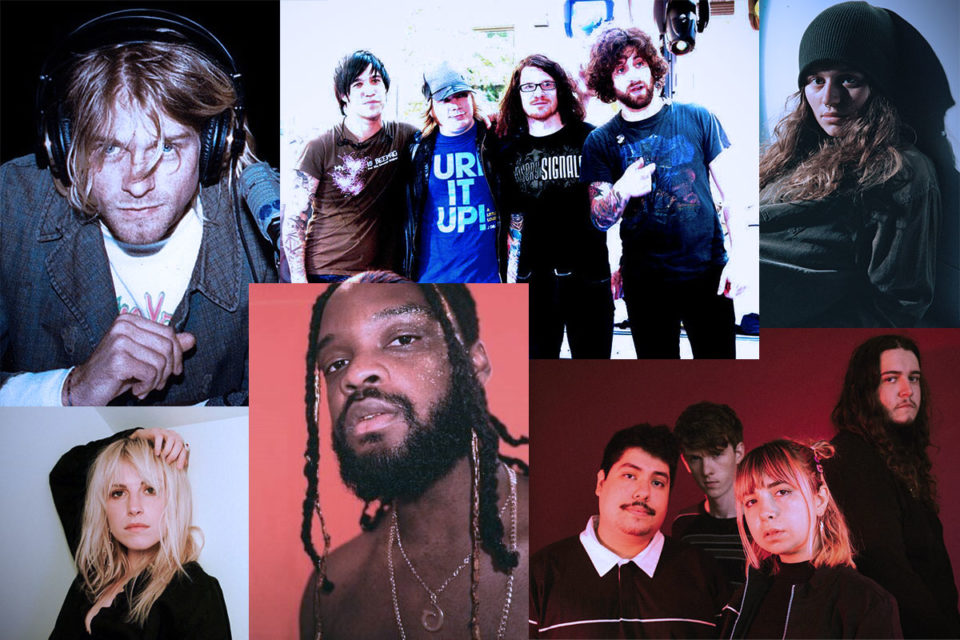For the last several days, we have celebrated #MentalHealthAwarenessMonth through music, with five-song mixes each weekday on #ThematicStatic at 9:11am. (You can stream all 30 songs, compiled from the six playlists, below.)
Culling these multi-genre, multi-generational tunes has been rewarding and incredibly, well, emotional. I’ve shared on-air the sentiments behind revelatory songwriting and resources for people in need, and it’s drawn me into my own (ongoing) journey of self-discovery and refreshed mournful memories of friends and icons lost to their struggles with addiction, depression and suicide.
A pivotal time for #MentalHealthAwareness in independent music was the ’90s-early ’00s pop-punk tangent lovingly, occasionally mockingly, known as “emo” (for all its unabashed emoting). But that’s not to say the genre was the advent of mental health topics explored through music.
Suicide awareness permeated the ‘burbs when top-billing grunge rockers Pearl Jam howled about teenage victim “Jeremy” in 1991, and the tragic deaths of Kurt Cobain and then Elliott Smith opened a national conversation about mental health in creative circles.
Black artists have long illuminated the link between racism and its social-emotional devastation: the crushing weight of stunted expectations, limited opportunities and brazen bigotry from their fellow countrymen and women, including those in power.
And yet it was a largely white, young gaggle of guitar-sporting artists around the turn of the century that gave its fans permission to rage, to pout, to examine themselves in a new way. The cadre, including Jimmy Eat World, Fall Out Boy and My Chemical Romance, ushered in a new (Dashboard) confessional style of rock music that often paired caterwauling with the channeled aggression of adolescence, and made it OK to not be OK.
Lyrics like “so sick so sick of being tired and oh so tired of being sick” from Taking Back Sunday characterized feeling low, almost inescapably. Then so did dancier emo acts including Panic! At the Disco and Middle Tennessee’s crown rock jewel Paramore. This brazen openness about unrelenting worry, sorrow and/or social strife opened up discussions about mental wellness. But the movement spawned more than just tear-stained cheeks and diary pages.
Adolescent girls and young women, especially, found solace, community and even self-esteem in being uncool, a full decade after the Riot Grrrl movement galvanized their big sisters and edgy aunts.
In a rash of sexist Satanic Panic among prudish circles in the mid-aughts, worried parents and pundits deemed emo’s female fans victims of art normalizing sadness and insecurity, instead of thinkers and feelers who found that “misery loves company” through music. But they were undeterred in the connectivity.
It’s not so surprising, then, that the young millennial and Gen Z performers now seizing influence are doing so with an unapologetic bend toward mental health topics.
Brit Awards Breakthrough Artist Arlo Parks paints anecdotes of hurt and hope in the sweetest, most soothing tones. Genre-bending Ghanian-Aussie Genesis Owusu raps in double entendre about attempting to dance and laugh off “the other black dog” of depression. Irish songwriter Orla Gartland’s upbeat single “More Like You” covets the cool, unattainable confidence of another woman. Modern emo-punk artists of color kennyhoopla and Yuno, respectively, bemoan being deemed a “lost cause” and fighting loneliness within one’s four bedroom walls. Marie Ulven of Norway, known as girl in red, speak-sings about taking medication to keep up her serotonin levels and beat back intrusive thoughts of self-harm. Talk about breaking the stigma!
Phoebe Bridgers is consistently confronting her past trauma in the most public and tuneful ways, while Beach Bunny singer and lyricist Lili Trifilio outs leering catcallers and would-be assaulters in “Blame Game.” Top-of-the-pops Billie Eilish and Demi Lovato have been incredibly open about depression despite — or in some cases because of — their rocket-rises to stardom.
Seriously overshadowing the beer-trucks-tight jeans patter that tops modern country charts (still…ugh), Nashville rock, pop and folk artists such as Bully, Joy Oladokun, Langhorn Slim, Tristen, Liza Anne, Dreamer Boy, Bantug and Maddie Medley are all creatives opening up about neurosis, “bummer days,” addiction, being “overweight with hate,” struggles in “coming of age,” and generally reckoning with oneself.
In a mighty, resonant second-act solo career, Paramore’s iconic frontwoman Hayley Williams has alternated big beats (on 2020 release Petals for Armor) and delicate whispers (on 2021’s Flowers for Vases) about being in your body, and regaining a will to live despite loss. In most of these evocative tunes, a relationship with another is almost an afterthought. The real shit is internal, and a lifelong, painful exploration to undertake.
Love ’em, loathe ’em, even condemn them, many “emo” bands at the turn of the century ushered in these modern norms in compelling songwriting that addresses depression, identity and struggle fitting in.
There’s no telling how unchecked and honest the music made by empowered future generations will be, with the shining examples of #MentalHealthAwareness dotting social media feeds and awards shows now. Meantime, you can count on WNXP to broadcast and give context to heartfelt tunes past, present and on the cusp of what’s next.

